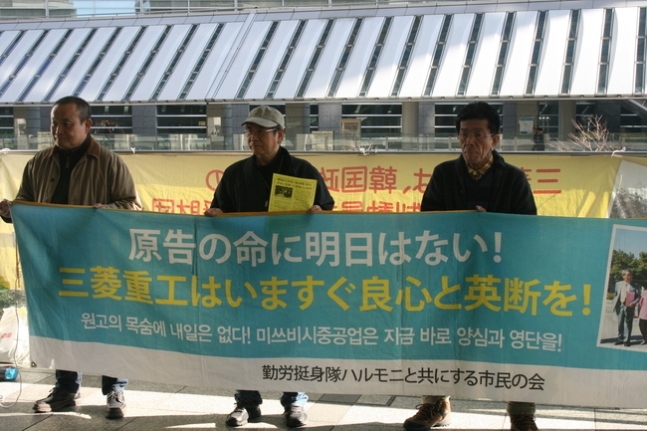 |
|
Supporters of Korean victims of forced labor under Japanese demand that Mitsubishi compensates the victims in front of the company’s headquarters in Tokyo on Nov. 30, 2018.
|
Victims to begin compulsory execution procedures on Mar. 1
Forced labor victims organized under the name, the Korean Women’s Volunteer Labor Corps, who were forced to work for Mitsubishi Heavy Industries during Japan’s colonial occupation of Korea have decided to initiate procedures for the compulsory execution of Mitsubishi’s assets in South Korea on Mar. 1. “If Mitsubishi Heavy Industries doesn’t obey the Supreme Court’s decision by February, we will initiate procedures for the compulsory execution of its domestic assets around Mar. 1,” said Kim Jeong-hui, an attorney who is representing the victims of compulsory mobilization at Mitsubishi, during a telephone call with the Hankyoreh on Jan. 6. The legal team is planning to send Mitsubishi’s main office a letter requesting negotiations on Jan. 18 and, if there is no response, to initiate compulsory execution procedures on Mar. 1, which will be the 100th anniversary of the Mar. 1 Movement. During a visit to the Japanese city of Nagoya on Jan. 4, the legal team discussed its plan with a Japanese civic group that funds legal action taken by forced labor victims in the name of the Korean Women’s Volunteer Labor Corps who worked for the Mitsubishi plant in that city. The legal team estimates that Mitsubishi owns around a thousand patents in South Korea. Mitsubishi also has an arrangement with a South Korean company that pays Mitsubishi 45 million won (US$40,390) a year as a technological licensing fee. If Mitsubishi continues to refuse to negotiate, it will trigger compulsory execution procedures in which these patents will be seized and then liquidated. “The victims and the legal team want an amicable solution through negotiations and through the comprehensive compensation of the victims of compulsory mobilization at Mitsubishi Heavy Industries who did not participate in the lawsuit. If a comprehensive and amicable solution is impossible, we will consider the compulsory execution procedure because the advanced age of the victims means that the realization of their rights cannot be delayed any further,” Kim said. In Nov. 2018, the Supreme Court ruled that Mitsubishi must pay damages to the victims and surviving families that had sued the company, but Mitsubishi has adamantly refused to do so. Following the Supreme Court’s decision, Mitsubishi stated its position on its website, describing the decision as “very regrettable” because it “runs contrary to the position of the Japanese government and Japan and South Korea’s agreement about the right to make claims.” On Dec. 31, the victims of compulsory mobilization at Nippon Steel and Sumitomo Metal, a Japanese company that committed war crimes during World War II, filed an asset seizure request at the Pohang branch of the Daegu District Court, the court with jurisdiction in the case. These victims are attempting to secure the damages they were awarded in a decision by the full bench of the Supreme Court, which ordered the company to pay each of the four plaintiffs 100 million won (US$89,761). By Ko Han-sol, staff reporter Please direct comments or questions to [english@hani.co.kr]






